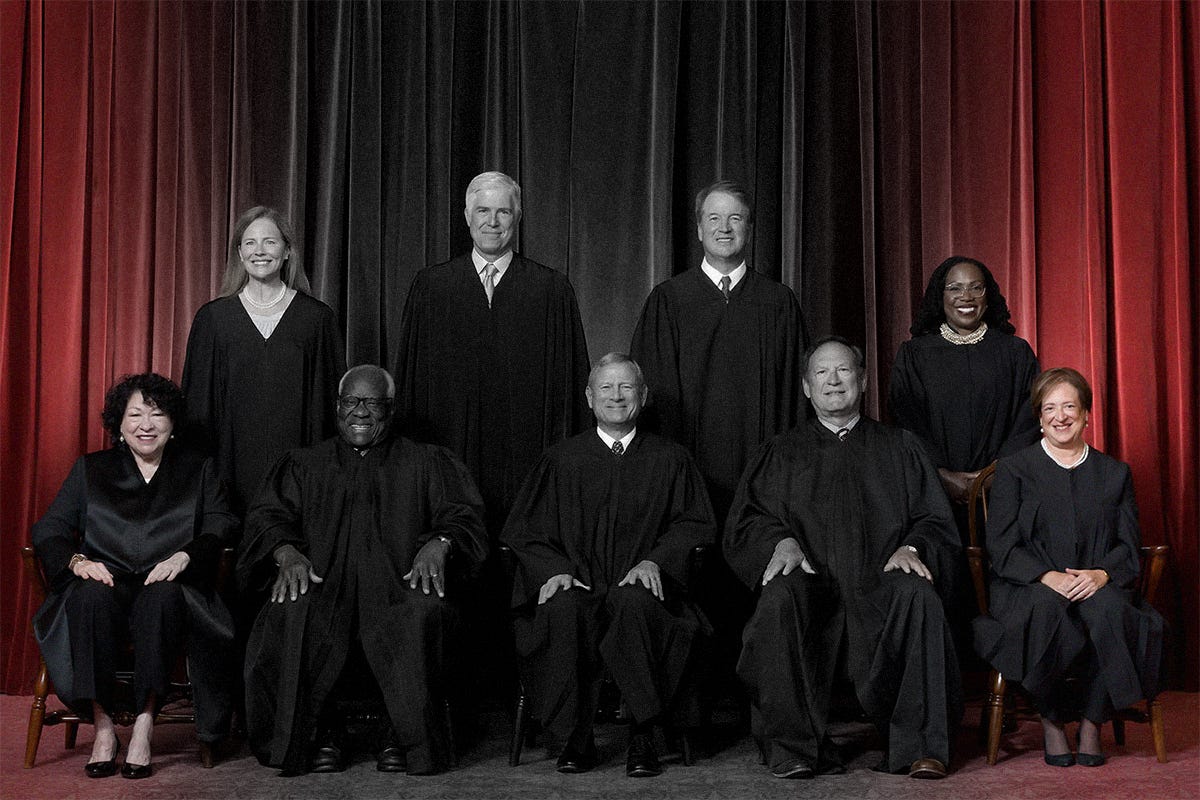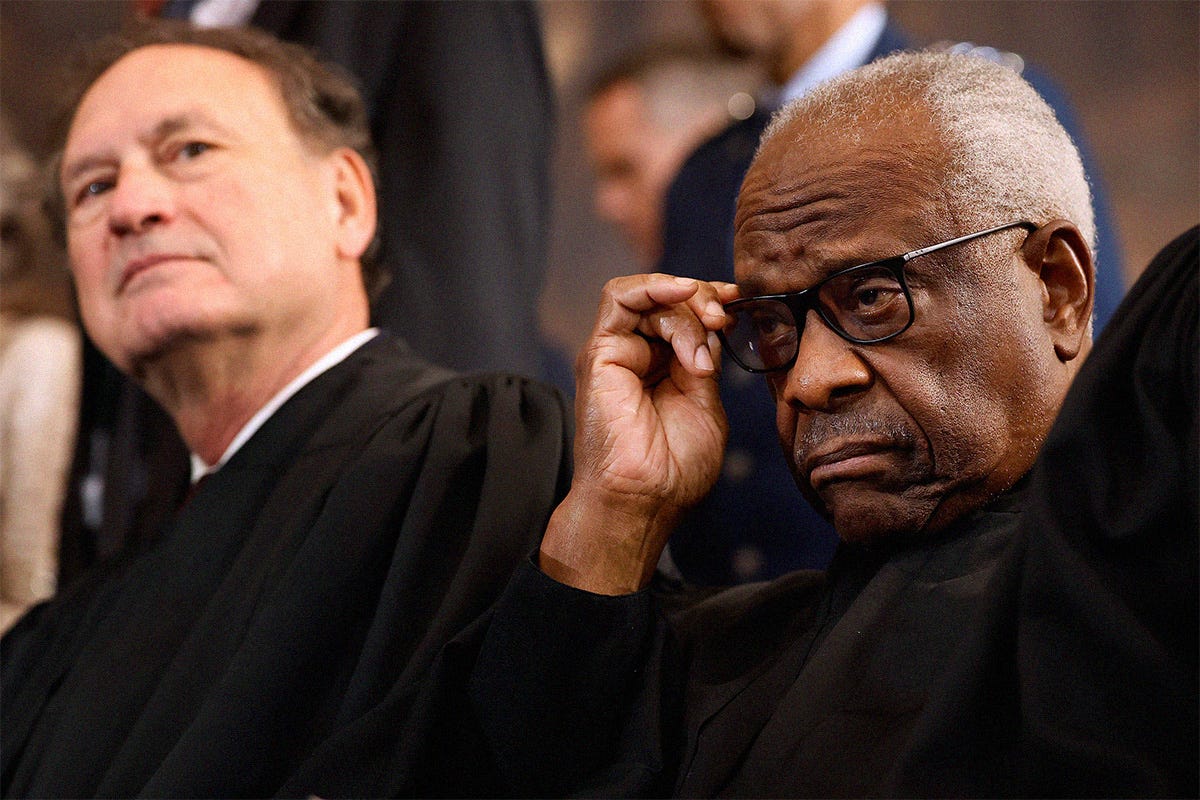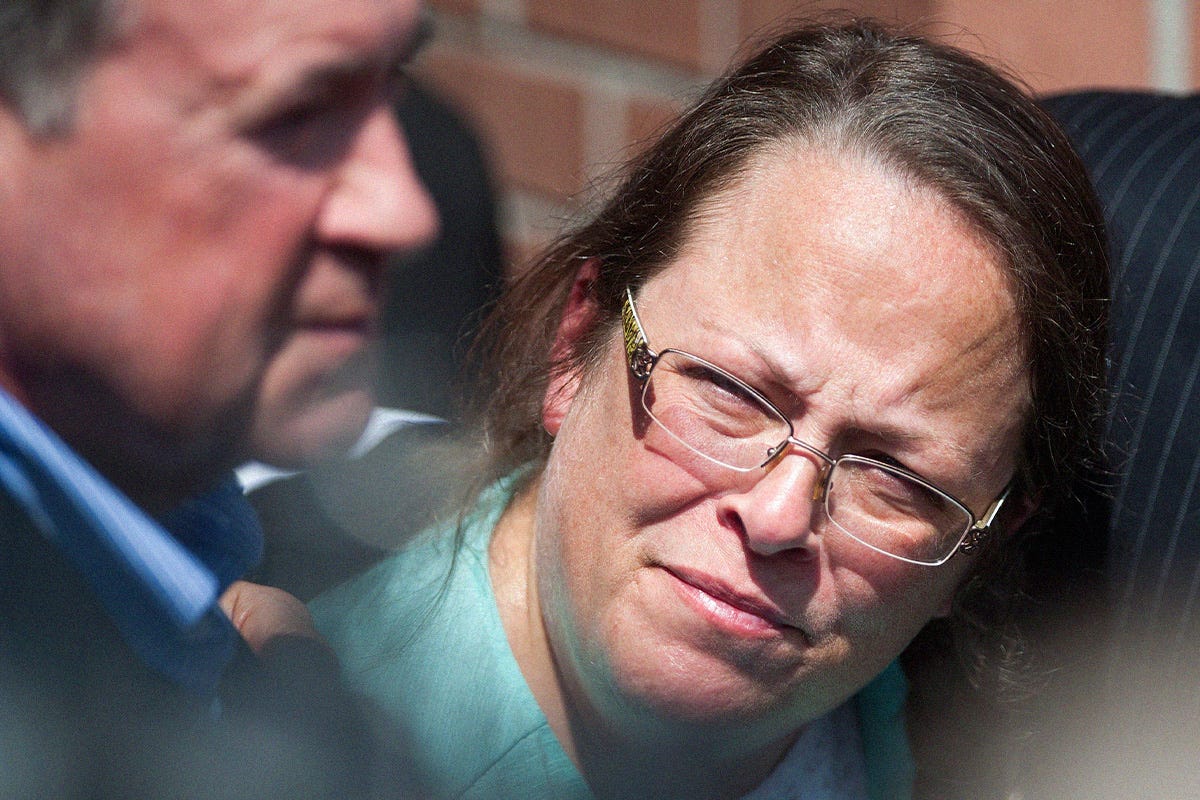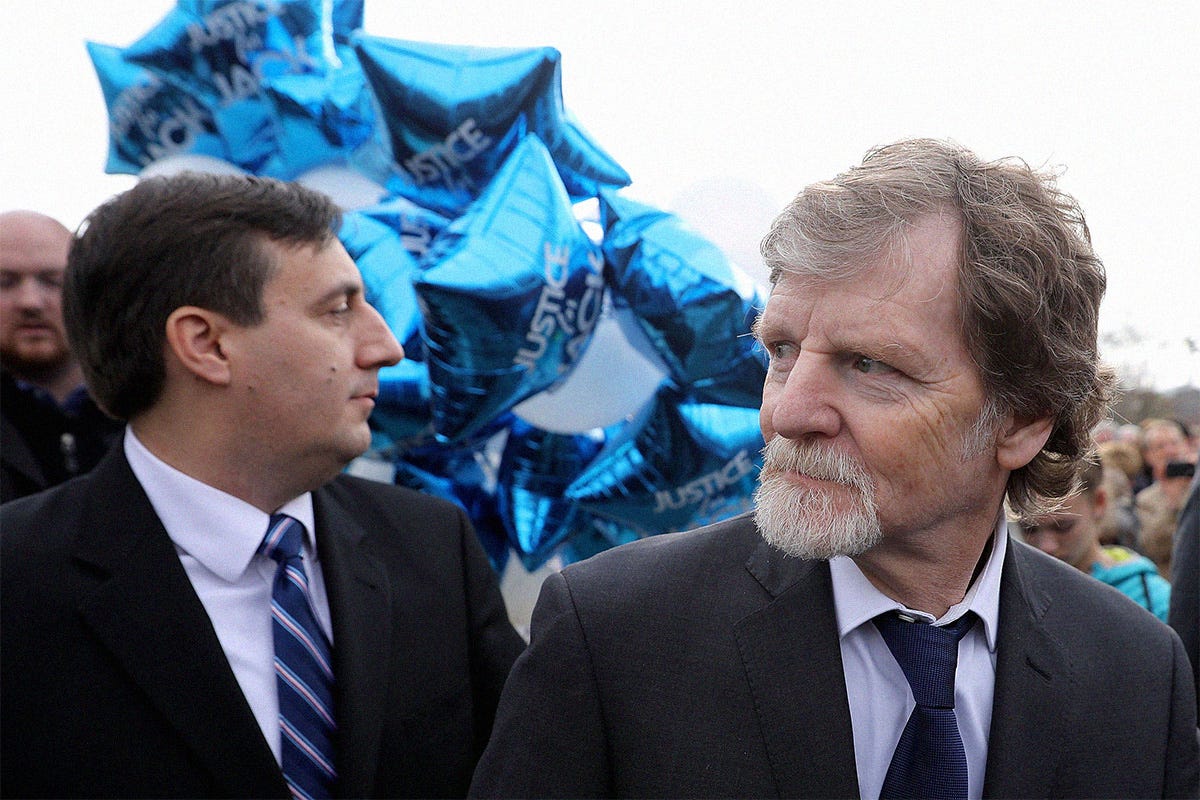The Supreme Court Has Already Been Chipping Away at Marriage Equality for Years
Even if Obergefell is spared, America’s quiet erosion of LGBTQ+ marriage rights is already well underway.
The Supreme Court is scheduled to hear a case in November that could potentially overturn marriage equality, but the truth is that the United States has been chipping away at the freedom to marry for years.
On November 7, America’s highest judicial body will hear a long-shot bid from former Kentucky clerk Kim Davis seeking to reverse the Supreme Court’s own 2015 ruling in Obergefell v. Hodges. In a petition to SCOTUS, Davis’s attorney, Mat Staver, said the 5-4 decision — which allowed queer couples to marry in all 50 U.S. states — is “egregiously wrong” and based upon a “legal fiction.” “The mistake must be corrected,” said Staver, who also serves as chairperson of the far-right extremist group Liberty Counsel. Deemed a “hate group” by the Southern Poverty Law Center, Liberty Counsel has claimed the legalization of marriage equality is “destructive to our very social fabric” and a slippery slope to pedophilia.
If Davis’ name seems familiar, she made national headlines in 2015 after refusing to issue marriage licenses to LGBTQ+ couples in Rowan County, Ky., leading her to be jailed for five days on contempt of court charges. David Moore and David Ermold, one of the couples who refused a license, eventually sued and were awarded damages of $50,000 each in a 2023 jury verdict (along with an additional $260,000 in legal fees). Although Davis pleaded with the U.S. Court of Appeals for the Sixth Circuit to intervene in her case, her entreaty was rejected.
While Davis and her legal team might believe that the most conservative Supreme Court in 90 years would be sympathetic to her plight, the votes may not be on her side. Although the arch-conservative Justices Samuel Alito and Clarence Thomas have openly called to revisit Obergefell, other right-wing members of the bench may not be so inclined. Although Chief Justice John Roberts joined the minority in opposing the nationwide legalization of marriage equality, he was in the majority on Bostock v. Clayton County, a landmark 2020 decision finding that federal civil rights laws barring sex-based discrimination also ban anti-LGBTQ+ bias. Fellow conservative Neil Gorsuch, a Trump appointee, personally authored the Bostock opinion.
Fears that the Supreme Court would nullify Obergefell outright were somewhat assuaged by a recent interview with Justice Amy Coney Barrett in The New York Times, during which she said the decision rests on “very concrete reliance interests” that would make it difficult to overturn. Defining “reliance interests” as referring to “things that would be upset or undone if a decision is undone,” Barrett claimed that deciding whether to undo precedent is not merely a question of: “Is this decision right or wrong?” “Because if a decision is wrong, then you have to decide whether you should keep it for many of the reasons you say: stability, reliance, interests, et cetera,” she said.
But even if the fickle tides of the Supreme Court turn against Davis, she can sleep soundly knowing that America doesn’t need her help in kneecapping the freedom to marry. Judicial and political authorities across the U.S. have repeatedly indicated their brazen willingness to methodically whittle down the rights of queer couples until their marriages are relegated to second-class status. When it comes to rolling back LGBTQ+ equality, this country much prefers the death-by-a-thousand-cuts approach.
The first blow to Obergefell was dealt in April 2016, when Mississippi passed what was, at the time, the single most extreme anti-LGBTQ+ law ever enacted by a U.S. state. Known as House Bill 1523, the statute allows people of faith to refuse goods or services based upon their “deeply held religious beliefs or moral convictions.” Although critics warned that the bill was so vaguely worded that it could potentially be used to ban women from wearing pants in the workplace, HB 1523 was an explicit response to the Supreme Court’s ruling on the freedom to marry one year prior. The first protected belief outlined in its bill text is that “marriage is or should be recognized as the union of one man and one woman.”
Although HB 1523 affected the entire LGBTQ+ community in Mississippi, the law particularly placed queer couples in the crosshairs. Under the discriminatory statute, landlords have the right to refuse housing to married LGBTQ+ partners on the basis of religion. Adoption and foster care agencies would have the ability to turn away queer couples seeking to give a child a loving home. The ACLU of Mississippi even predicted it would grant exactly what Davis is asking for: allowing county clerks to recuse themselves from being forced to certify LGBTQ+ unions.
HB 1523 has quietly stayed on the books for close to 10 years because the courts have declined to halt its enforcement. Although U.S. District Judge Carlton W. Reeves initially paused HB 1523 due to his belief that it would ultimately be found unconstitutional, the U.S. Court of Appeals for the Fifth Circuit reversed his injunction in June 2017. The court found that because plaintiffs had not yet been targeted under the law, LGBTQ+ Mississippians did not have a legal right to sue. In January 2018, the Supreme Court declined to hear an appeal challenging HB 1523, thereby allowing Mississippi to continue willfully discriminating against queer couples.
In the near-decade since HB 1523’s passage, numerous laws have been enacted seeking to prevent LGBTQ+ married couples from having the same rights and protections as other wedded partners. Getting to the punch early, Tennessee passed a law in 2017 mandating that words like “husband” and “wife” be legally interpreted as to their “natural and ordinary meaning.” While Gov. Bill Haslam (R) denied that HB 1111 was a swipe at marriage equality, conservative groups that lobbied for the bill, such as the Family Action Council, admitted that it was intended to prevent queer and opposite-sex families from receiving equal treatment under the law. A lawsuit seeking to void HB 1111 was thrown out of court later that same year, and it has since remained in place.
The attacks on marriage equality over the past decade have been extremely wide-ranging, and in truth, they are just getting started. At the time that Mississippi’s law was enacted, just two states restricted foster care and adoption for queer couples: Nebraska and North Dakota. At the time of publication, at least 14 states currently allow faith-based agencies to turn away prospective parents because they are LGBTQ+. At least two states permit judges or other officiants to refuse to perform queer ceremonies: Tennessee (yet again) and Texas. The latter move came courtesy of the Texas Supreme Court this very month.
The nation’s most powerful legal authorities have not only done little to stop the escalating war on marriage equality, but they have also, in many cases, encouraged it. When Christian baker Jack Phillips pleaded with the Supreme Court to let him ignore Colorado laws that would compel him to treat queer couples equally, the justices ruled narrowly in his favor. SCOTUS gave a similar pass to Arizona designer Lorie Smith, who was granted permission to refuse to create LGBTQ+ wedding websites (even though she had never been asked to do so).
Civil rights advocates have declared many of these decisions to be split: neither an outright defeat for LGBTQ+ equality nor an unbridled victory for conservatives. When the Supreme Court ruled that Philadelphia discriminated against a Catholic foster care agency by requiring that it work with queer couples, the Human Rights Campaign (HRC) noted that the verdict actually upheld the validity of laws protecting the LGBTQ+ community. “The Court ruled that governments can enforce nondiscrimination laws as long as they do so neutrally, but that the city of Philadelphia was not neutral in its application of its nondiscrimination laws,” HRC said in a press release at the time.
The Supreme Court has left many of the biggest questions unanswered, though, as it effectively kicks the can down the road on equality.. Because many of its rulings are idiosyncratic and not intended to be sweeping, it’s not always clear how broadly they can be applied: Is it OK now for bakers not to bake cakes for gay weddings? Can website designers just say no to queer ceremonies? Illustrating the mass confusion over where LGBTQ+ couples stand, a “No Gays Allowed” sign at a Tennessee gas station went viral on social media following the SCOTUS ruling on wedding websites. The display actually dated back to the days of Obergefell — posted just hours after the decision came down — but people shared the message as if it just happened.
It remains to be seen whether the Supreme Court will entertain Davis’s wish to negate the marriages of more than 820,000 queer couples. (The smart money is they don’t, especially given that they already snubbed her once before.) But no matter the outcome, the truth is that LGBTQ+ Americans do not have true marriage equality. Despite our community’s hard-won progress, the U.S. is just as it was in the days before Obergefell: a country that operates under a patchwork of protections for marginalized people, where an individual’s rights are dependent upon their zip code.
A system in which queer couples can get married on Sunday but are refused a table at a restaurant for it on Monday isn’t full equality. It’s lip service.







